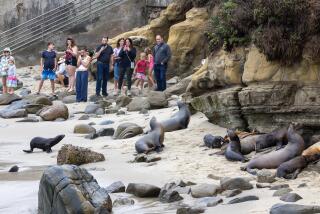More than a dozen sea lions along the Malibu coast are reported sick. What’s making them ill?

- Share via
At least 14 sea lions were reported sicked off the coast of Malibu due to toxins created by harmful algal blooms, according to the California Wildlife Center.
Over the last five days, a team from the California Wildlife Center responded to calls of at least 14 sick sea lions, according to a social media post. Based on the behavior of the animals, experts believe that the sea lions were sick from domoic acid exposure.
Domoic acid is a neurotoxin produced by harmful algal blooms that accumulates in filter-feeding fish, including anchovies and sardines. Those fish are then eaten by seals, sea lions and dolphins.
A similar outbreak was recorded last summer among more than 70 sea lions, as well as two dolphins and two fur seals along the coast in Santa Barbara and San Luis Obispo counties.
Los Angeles County health officials have identified three more cats with presumptive H5N1; the source of the virus has not yet determined, but experts suspect raw meat.
The exposure damages the brain and heart in mammals. Symptoms include seizures, a craning head motion known as “stargazing” and a comatose state. Experts advise humans not to interact with animals believed to be sick because they might bite or lunge without warning.
The animals can be treated, but moving an ill sea lion to a facility can be difficult because an adult female can weigh up to 250 pounds and an adult male up to 1,000 pounds, requiring several people to move each animal.
“Malibu residents, visitors, and other beachgoers are advised to keep their distance from animals on the beach and call or text our Marine team at (310) 924-7256 for assistance with animals in distress,” according to the wildlife center.
More to Read
Sign up for Essential California
The most important California stories and recommendations in your inbox every morning.
You may occasionally receive promotional content from the Los Angeles Times.












